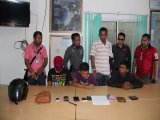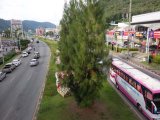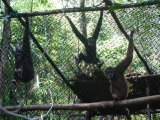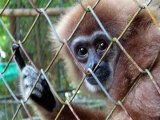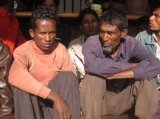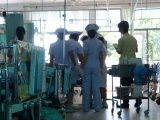PHUKET: There's a wild whoo-whoo-whoo in the air as we head off from the Gibbon Rehabilitation Project's centre on Phuket on a mission of freedom.
Gibbons only make this noise because they are grouped together. In the wild, in their own treetop territory, you will probably hear just one.
There was a time not long ago when it was impossible to hear a single gibbon on Phuket. They were wiped out in the 1980s by ignorant killers.
Now, in a remarkable example of how the damaging inclinations of humans can be reversed, gibbons are being reintroduced at Khao Phraw Thaew, Phuket's last sizeable rainforest.
We're on the trail to a netting cage deep in the jungle where Cop, a female rescued from Patong touts, has been captive with male Jorn and their young son, Sherpa, for a year now.
Along the trail, two guides debate whether tourists should be give access further into the jungle.
''We need to cut out all these thorny plants that spike people.''
''No, they're spiky, but natural. Let them grow.''
''We need to make a bridge over the streams so that we don't get sued if someone breaks a leg.''
''No, the rocks are ok. Leave it natural.''
''If we make the path concrete, more people can come.''
''No. For now, the gibbons are safe because it's hard to reach them.''
Two kilometres in, along the trail that takes us past Bang Pae waterfall, soon to be crammed with Sunday afternoon swimmers, we reach the release site.
About 20 of us, mostly volunteers with a BBC camera team, are told to be as quiet as possible.
The entrance to Cop's cage is raised by pulling on a rope, and the adventure begins. Freedom calls.
Jorn is quick to take advantage of the exit sign. Cop is not far behind. As the captives emerge, it's impossible not to feel a sense of exhilaration.
Journalists are taught never to ascribe human traits to animals, but with fellow primates like Cop and company, it's impossible not to share the joy of a moment like this one.
The parents effortlessly clamber up tall trees and take in the jungle that until now they'd only been able to see from the other side of the netting.
Young Sherpa, aged two, has never experienced freedom. He waits in the cage. After 30 minutes of exploration, his parents decide it's safe and time for him to join them.
On a daily basis, rangers will continue to look after the gibbon family until they are certain to be safe to fend for themselves.
There are now 30 gibbons living in the wilds of Phuket, and that's quite an achievement. On the way up to Cop and family, the first gibbon freed on Phuket, Kit, swung down to inspect us on the trail.
Nothing quite equals seeing these creatures, free of netting and cages; enjoying their Phuket jungle canopy.
Hundreds of kilos of food have to be carried into the wilderness by volunteers, no great hardship when there are a dozen of them, but difficult when numbers drop to just three, as happened recently.
Back at the centre, a gibbon couple and their newborn are feeding in a cage set well away from the public area, to prepare them for their chance at freedom.
The cry goes up, whoo-whoo-whoo's next?
To volunteer or donate towards a Phuket gibbon canopy walk, call the Gibbon Rehabilitation Project on +66 (0)76 260491 or visit: www.gibbonproject.org
Gibbons only make this noise because they are grouped together. In the wild, in their own treetop territory, you will probably hear just one.
There was a time not long ago when it was impossible to hear a single gibbon on Phuket. They were wiped out in the 1980s by ignorant killers.
Now, in a remarkable example of how the damaging inclinations of humans can be reversed, gibbons are being reintroduced at Khao Phraw Thaew, Phuket's last sizeable rainforest.
We're on the trail to a netting cage deep in the jungle where Cop, a female rescued from Patong touts, has been captive with male Jorn and their young son, Sherpa, for a year now.
Along the trail, two guides debate whether tourists should be give access further into the jungle.
''We need to cut out all these thorny plants that spike people.''
''No, they're spiky, but natural. Let them grow.''
''We need to make a bridge over the streams so that we don't get sued if someone breaks a leg.''
''No, the rocks are ok. Leave it natural.''
''If we make the path concrete, more people can come.''
''No. For now, the gibbons are safe because it's hard to reach them.''
Two kilometres in, along the trail that takes us past Bang Pae waterfall, soon to be crammed with Sunday afternoon swimmers, we reach the release site.
About 20 of us, mostly volunteers with a BBC camera team, are told to be as quiet as possible.
The entrance to Cop's cage is raised by pulling on a rope, and the adventure begins. Freedom calls.
Jorn is quick to take advantage of the exit sign. Cop is not far behind. As the captives emerge, it's impossible not to feel a sense of exhilaration.
Journalists are taught never to ascribe human traits to animals, but with fellow primates like Cop and company, it's impossible not to share the joy of a moment like this one.
The parents effortlessly clamber up tall trees and take in the jungle that until now they'd only been able to see from the other side of the netting.
Young Sherpa, aged two, has never experienced freedom. He waits in the cage. After 30 minutes of exploration, his parents decide it's safe and time for him to join them.
On a daily basis, rangers will continue to look after the gibbon family until they are certain to be safe to fend for themselves.
There are now 30 gibbons living in the wilds of Phuket, and that's quite an achievement. On the way up to Cop and family, the first gibbon freed on Phuket, Kit, swung down to inspect us on the trail.
Nothing quite equals seeing these creatures, free of netting and cages; enjoying their Phuket jungle canopy.
Hundreds of kilos of food have to be carried into the wilderness by volunteers, no great hardship when there are a dozen of them, but difficult when numbers drop to just three, as happened recently.
Back at the centre, a gibbon couple and their newborn are feeding in a cage set well away from the public area, to prepare them for their chance at freedom.
The cry goes up, whoo-whoo-whoo's next?
To volunteer or donate towards a Phuket gibbon canopy walk, call the Gibbon Rehabilitation Project on +66 (0)76 260491 or visit: www.gibbonproject.org

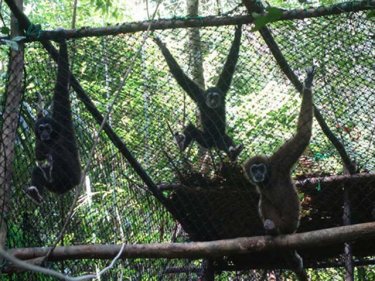
.jpg)
.jpg)
.jpg)
.jpg)
.jpg)


